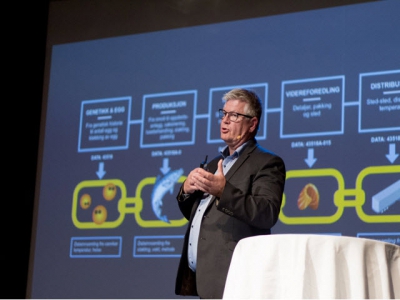Why aquaculture is becoming big on blockchain

The value of adopting blockchain technology in the aquaculture sector was the subject of a special seminar at Aqua Nor this week.
Trond Henriksen, aquaculture manager at Atea Norge. © Tonje Bue, Atea
The seminar explained how a number of aquaculture businesses were working with the blockchain specialist Atea to pilot projects to secure transparency, sustainability and traceability in their value-chains.
Alf-Gøran Knutsen, CEO of Kvarøy, backs the use of blockchain technology in aquaculture
In order to address issues related to costs, food fraud, food waste, food-related illnesses and traceability, Atea has developed data platforms to utilise blockchain technology that can securely and efficiently collect, share and analyse vast quantities of data. The aquaculture industry collects substantial amounts of data, but with key data being somewhat inaccessible, the potential to effectively utilise it remains problematic. As a member of the Norwegian association of seafood businesses (Sjømatbedriftene), a joint session was hosted on how blockchain technology can secure the value chain for the ocean industries. Through IBM, blockchain is now commercially available to combat fraud and document a long and complex production cycle for seafood, enabling consumers to fully trust seafood from Norway.
Delegates heard from several key companies working to create a more sustainable and transparent value-chain, among them BEWI, IBM, BioMar and Kvarøy Fiskeoppdrett.
The latter gave the audience valuable insights into how they are working with Atea to implement blockchain technology.
Alf-Gøran Knutsen, CEO of Kvarøy, said: “It really comes down to three specific reasons why we are implementing this technology:
Security – the industry and the consumers must be absolutely sure that the fish they are purchasing is the correct fish. We invest heavily in sustainable farming and cannot risk inferior product being sold as our own.
Market demands – supermarket chains are demanding proof; they want to know where the food is coming from.
Traceability – customers and consumers demand traceability and the systems today are sub-standard and do not provide adequate information."
Having launched their oceans and aquaculture specialised team only two years ago the northernmost branch of Atea, has already seen a massive interest from the industry with regards to digital strategy, artificial intelligence and blockchain.
"Several projects have been launched using blockchain as well as other cutting-edge technologies to support the industry in making better, more effective decisions during the production cycle. Gathering data on the environmental impact as well as feed, growth and fish health are key factors when raising salmon sustainably. Support from Innovation Norge has enabled Atea to gather more relevant data, thus creating better solutions and more detailed reporting back to the participating businesses. We are excited about the opportunities this creates for our customers and partners," said Trond Henriksen, aquaculture manager at Atea Norge.
Buy aquaculture books at 5mbooks.com
“It really is simple,” added Espen Braathe at IBM Food Trust Europe. “Food fraud is a global business exceeding $10 billion annually. This is big business; we need to ensure that our fish is traceable, and we can do so by utilising blockchain technology.”
Related news
 Seafood export rushes to achieve target
Seafood export rushes to achieve target Shrimp exports are expected to be optimistic during the last months of this year as global demand will climb during Christmas and New Year holidays
 Tuna exports endure sluggish growth
Tuna exports endure sluggish growth Vietnam’s tuna exports saw sluggish growth during August with export value reaching approximately US$65 million, a rise of nearly 3% against the same period
 Vietnam takes drastic measures to prevent chemically injected shrimp
Vietnam takes drastic measures to prevent chemically injected shrimp Nine samples of commercial white leg shrimp have been taken suddenly, unannounced, and at random from Tuy Phước, Phù Cát, and Phù Mỹ districts